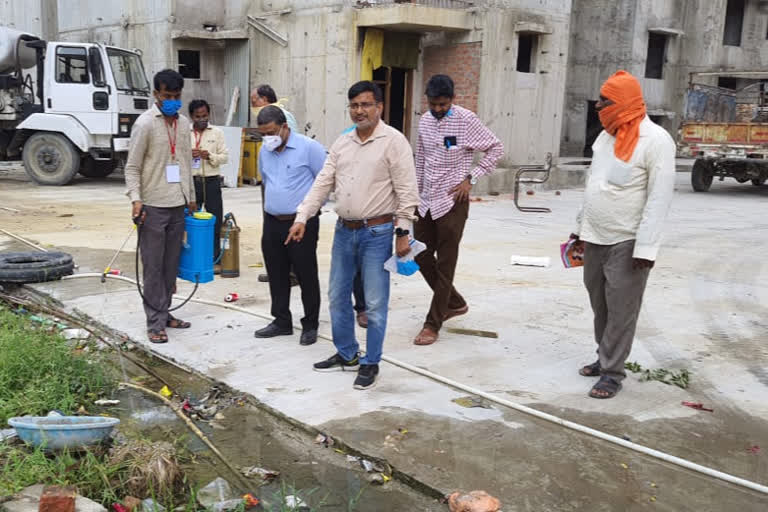Lucknow: Though corona cases are on the decline in Uttar Pradesh, people are now reeling under fever with cases of scrub typhus and leptospirosis being detected. At the same time people are also suffering from fever due to dengue. According to a report received by the districts from the state health directorate, 155 patients have been detected with dengue and the disease is expected to remain active till the first week of November.
According to Director of Communicable Diseases Major Dr GS Bajpai, there is a danger of dengue till a month after the end of the rains. In such a situation, there is a possibility that till the first week of November, people will have to be more cautious. On the other hand, an alert has been issued to all districts regarding spread of dengue. Arrangements have been made for free treatment at hospitals. Door-to-door survey of patients with fever is also being conducted.
Following the survey, serious patients are being shifted to hospital. As of last Thursday, 129 dengue cases were found in 14 districts. On Friday, 154 more dengue patients were found. A total of 2,073 cases have been reported in the state from January 1 to September 12 in 58 districts. At the same time, 155 new patients were found from Sunday to Monday morning. There are now a total of 2,228 dengue patients.
Private pathology labs in the state capital are arbitrarily charging patients for dengue test. These labs are charging from Rs 1,800 to Rs 2,000 for the test. Not only this, the fees for the test are different in different labs. Chief Medical Officer Dr Manoj Aggarwal has said that the rates for dengue test in private pathology labs will be fixed. Dengue ELISA test will cost between Rs 1,200 and Rs 1,400. Those who go to these labs for the test will be charged Rs 1,200.
Also read: Be cautious of both dengue and COVID: Kejriwal
On the other hand, if the sample is collected from home, a fee of Rs 1,400 will have to be paid. Similarly, the platelets count at the labs will cost while Rs 250 while Rs 350 rupees will be charged for taking the sample from home. At the same time, one unit of platelets will be available for Rs 400 and this proposal has been sent to the district administrations. Meanwhile, notices have been issued to 800 houses where larvae have been found.
According to Dr. Balram Bhargava, head of the Indian Council of Medical Research (ICMR), most of the deaths in Firozabad district of Uttar Pradesh are due to the D-2 strain of dengue fever. He said that this strain is very deadly and fatal. This often causes bleeding. Apart from this, it also affects the platelet count rapidly. This strain has also been found in Mathura and Agra.
Dr Bhargava has advised people not to take any fever lightly, be it malaria, dengue or COVID. He said that at this time there is a risk of both COVID and dengue and both can be fatal.
In Type 1 dengue, there is pain in the body, joints and head along with high fever. It can be cured in five to seven days by taking medicines.
In Type 2 dengue hemorrhagic fever, the platelets in the patient's body rapidly get reduced. Bleeding starts and blood starts accumulating in different parts of the body. It can also reach the lungs, stomach, kidney or brain. At the same time, there are rashes on the body, from which blood keeps leaking. This fever can be fatal.
In Type 3 dengue, the patient experiences a sudden drop in blood pressure along with fever. The risk of internal bleeding is high and the patient goes into shock. Multi-organ failure occurs, due to which the patient can die. In this fever, the patient also suffers from a lot of weakness.
Also read: Dengue: Mayawati tells Yogi to improve medical facilities to save lives
High fever, headache, muscle, joint pain, pain behind the eyes, weakness, loss of appetite and nausea , red-pink rashes on the face, neck, chest are symptoms of dengue. On the other hand, in Type 2 dengue, there is bleeding from the nose, mouth, gums and and in feces. Also, in Type 3 dengue, there is low blood pressure, the patient may faint, and the platelets in the body start decreasing continuously.
People should not allow water to accumulate in and around the house and attention should be paid to water-logging in the cooler, bathroom and kitchen. Mosquito larva in accumulated water can be killed by spraying oil. Water dripping from the AC tray should be cleaned daily. Clean the water dripping tray of AC daily and water should not be allowed to accumulate in pot kept in the house. People should not keep broken cans, tyres, utensils, bottles etc. on the roof. The utensils used for giving feed and water to birds should be cleaned daily. People should wear clothes that cover the body completely. Children should be made to wear trousers and full-sleeved shirts. If possible, people should sleep under a mosquito net.
One should also take care of diet during fever. It is advisable to eat nutritious food with green vegetables and fruits and drink plenty of liquids. People should take water, soup, milk, buttermilk, coconut water, ORS solution, juice, shikanji etc. but should not eat stale and oily food.



